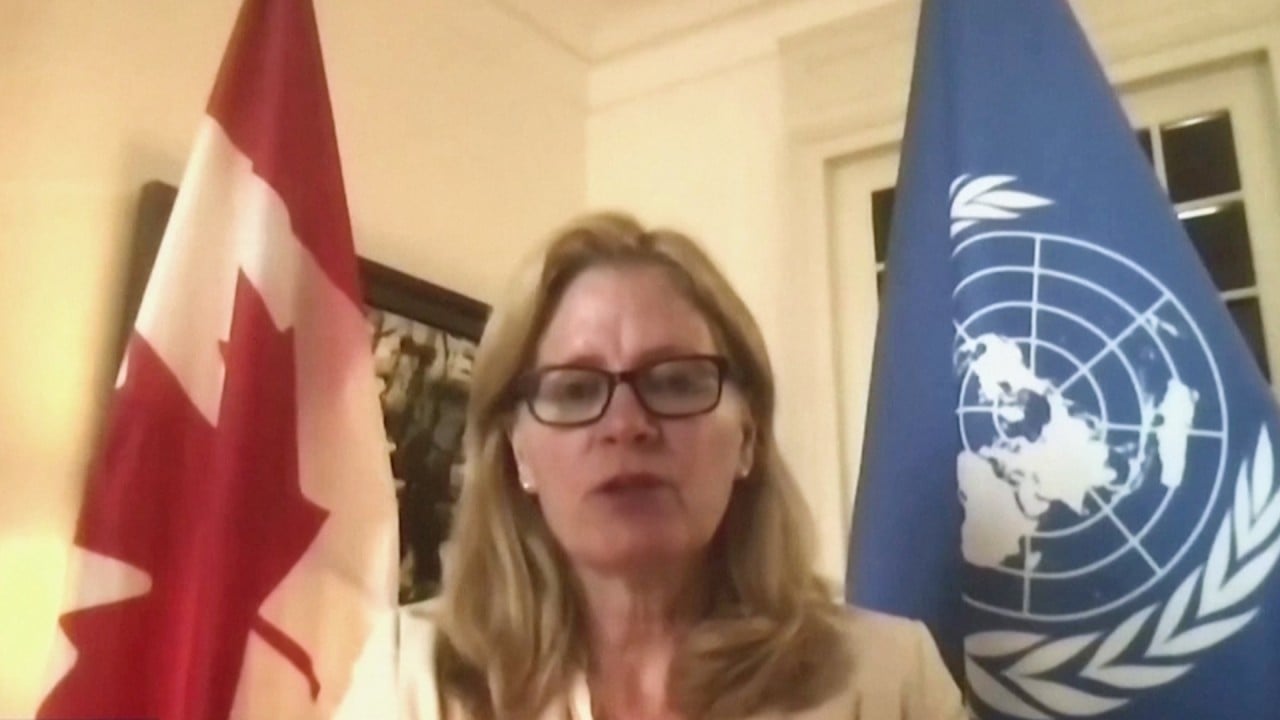
China claims it has improved people’s lives in Xinjiang after US warning
- White paper says the region ‘is now a stable and orderly society’, ethnic minorities have political representation and living standards are rising
- It follows US advisory telling firms they risk breaking the law by doing business there, citing evidence of forced labour and other rights abuses

02:06
Biden says G7 leaders agreed to call out China over human rights abuses in Xinjiang and Hong Kong
On Tuesday, the US State Department issued an advisory warning American firms that they may wind up breaking the law if they continue doing business in Xinjiang. “Given the severity and extent of these abuses, businesses and individuals that do not exit supply chains, ventures and/or investments connected to Xinjiang could run a high risk of violating US law,” the advisory said, citing evidence of forced labour, intrusive surveillance, genocide and other human rights abuses.
None of these issues were addressed in the white paper, Beijing’s latest response to the widespread criticism. Instead, it covers seven areas where it claims the government has worked to protect rights in Xinjiang – in civil, political, economic, cultural, societal, women and children’s, and religious rights.
Its introduction highlights the idea that ethnicities are all equal before the law. Ethnic minorities in China have long received preferential treatment in areas from university entrance exams to family planning. In recent years, Beijing has wound this back in order to create a “ethnicity-blind” country, according to James Leibold, a professor in China studies at La Trobe University in Australia.
Since 2017, for example, Han Chinese in the region – who account for over 90 per cent of China’s population but around half of Xinjiang’s – have been able to have the same number of children as ethnic minorities.
China has been accused by the US and other countries of committing genocide by targeting ethnic minority groups like the Uygurs through its family planning policies.
US sanctions 23 more Chinese companies for suspected Xinjiang abuses, military and business ties
In the civil rights section, the white paper says that in the past four years there have been no terrorist attacks in Xinjiang, which Beijing claims had been plagued by religious extremism and separatists.
“[These separatists] inserted extremist religious ideologies into the daily life of civilians, using the excuse of religion to incite and force women to wear face-covering burkas, men to grow long beards,” it says.
On political rights, it highlights the representation of Xinjiang’s ethnic minorities in local and national governing bodies, saying they account for more than 60 per cent of the region’s delegates at the national legislature.
It points to rapid improvements in the region’s economy and living standards, saying that between 1955 and 2020 GDP increased 160 times, while GDP per capita multiplied by 30 times.
The cultural rights section says education has improved for ethnic minorities in Xinjiang, with 99 per cent enrolment at its high schools last year. It also states that all ethnic minorities have the right, under China’s constitution, to study their own language.
However, Timothy Grose, an associate professor in China studies at the Rose-Hulman Institute of Technology in Indiana, told the Post in March that Uygur-language education had been drastically cut back since 2004, when classes in the language at Xinjiang University were discontinued.
The white paper also highlights health insurance, retirement pensions and other state financial support. It claims people in Xinjiang have seen long-term improvements in living standards such as life expectancy, which it says more than doubled from 30 years in 1947 to 74.7 in 2019.
It covers gender equality, saying women will play an increasingly important role in their communities.

01:11
Canada leads call by more than 40 countries for China to give UN access to Xinjiang
And on the controversial issue of religious freedom amid reports of a crackdown, the white paper claims there are efforts being made to preserve religious culture in Xinjiang and that several mosques in the region are being renovated by the government.
US-based Grose, who speaks Uygur and Mandarin, said his research showed that daily religious customs were being curtailed all over Xinjiang.
“Of course, the [Chinese] constitution gives freedom of religious belief, but when it comes to the expression of that belief, there are stricter and stricter, almost suffocating restrictions [in Xinjiang] – from who can attend the mosque, what kind of religious articles you can have at home … to who can fast during Ramadan,” he said.
Beijing’s white paper concludes that criticism and pressure over its policies in Xinjiang is an excuse for foreign forces to smear and contain China. “For a time, certain international forces have neglected the efforts of the Chinese government in ensuring the equal rights of all ethnic minorities, neglected the historical improvement of human rights in Xinjiang,” the white paper says.
It is Beijing’s latest attempt to promote its narrative on the situation in Xinjiang, which it has also done through state media documentaries and press conferences where ethnic minorities speak of how well they are doing thanks to the Communist Party.

